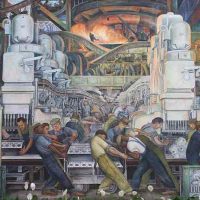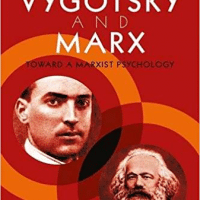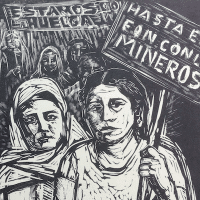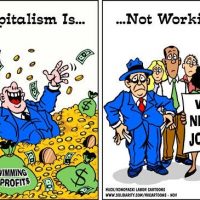-
Exploitation, Marxism, and Labour Law (Part Two)
The first model is a radical critique of all forms of bourgeois right, including employment rights, which are considered to constitute an ideological reflection of the capitalist mode of production, and therefore an inseparable companion of exploitation.
-
The butcher washes his hands before weighing the meat
It has been almost a year since we got off the ground. Our offices across the world humming with activity. You have received forty-four newsletters from us, eleven dossiers and one notebook and one working document. More is on the way as we enter our second calendar year.
-
Exploitation, Marxism, and Labour Law (Part One)
On trial with other members of the Rhenish District Committee of Democrats in 1849, Karl Marx argued in a Cologne court that their prosecution was based upon “laws which the Crown itself has trampled into the dirt”.
-
Down with neoliberalism . . . as a concept
I think the left should stop talking about ‘neoliberalism’, as I argue in a recent journal article published in Capital & Class.
-
International Institutional Monopoly Capitalism and Its Manifestations
Monopoly capitalism emerged from “laissez-faire” capitalism in the late nineteenth and early twentieth centuries, allowing giant corporations to dominate the accumulation process.
-
Starting again from Marx
Let us start again from Marx.(1) Why? Is it because we are communists? No, this answer is not convincing. We could start again from somewhere else, from Lenin, or Mao; or, we could believe that current feminist or anti-racist struggles have no need for Marx; we could even think that Marx’s Eurocentrism makes him an enemy.
-
We have no choice but to live like human beings
One in eight people across the world live in informal settlements. This, despite the “right to a standard of living adequate for the health and well-being of himself and of his family” as declared by the International Declaration of Human Rights. Reality, however, is very far from this.
-
Building a Marxist psychology
Carl Ratner is one of few psychologists working today who aims to develop psychology on an unabashedly Marxist foundation. The dominant narrative in psychology is that our minds and our society are direct manifestations of human biology.
-
The Nobel Prize for climate catastrophe
The economist William Nordhaus will receive his profession’s highest honor for research on global warming that’s been hugely influential—and entirely misguided.
-
A Marxist theory of women’s oppression
In the new introduction to Lise Vogel’s Marxism and the Oppression of Women: Toward a Unitary Theory, Susan Ferguson and David McNally comment on the book’s “curious life-history.” They describe it, quite correctly, as a book that has lived largely in obscurity in spite of its innovative approach to the question of Marxism and women’s liberation and its enormous, though largely neglected, contribution to this important topic.
-
This economic policy has been a disaster, a calamity for the country’s public life
As AMLO begins his presidential term in Mexico, he has been confronted by years of neoliberal policies, policies crafted by institutions like the IMF and the World Bank, who praised the selling off of Mexico’s assets as a model. When protestors contest this agenda—as they recently did at the G20 meeting in Buenos Aires—, the reply from leaders comes written in tear gas. Meanwhile, tens of thousands of farmers and thousands more of those who stood with them marched across Delhi to demand a parliamentary session to address the agrarian crisis.
-
Contemporary capitalism and the world of work
The most significant feature of contemporary capitalism which is of relevance to the world of work is its inability to provide work to a substantial proportion of persons looking for it.
-
Analysis: fossil-fuel emissions in 2018 increasing at fastest rate for seven years
Hopes that global CO2 emissions might be nearing a peak have been dashed by preliminary data showing that output from fossil fuels and industry will grow by around 2.7% in 2018, the largest increase in seven years.
-
Gandhi, Marx & the ideal of an ‘unalienated life’
In this in-depth interview, Akeel Bilgrami speaks on a wide range of issues of intellectual relevance and contemporary importance such as the relationship between Gandhi and Marx, issues of modernity, Chomsky’s philosophy, personal influences, academic philosophy in India, secularism, caste and current politics in India, Hindutva politics and the criminal threat of the present government, the Hindutva political challenge and ways of resistance, and the importance of Left politics.
-
Scientists warn the UN of capitalism’s imminent demise
Capitalism as we know it is over. So suggests a new report commissioned by a group of scientists appointed by the UN Secretary-General. The main reason? We’re transitioning rapidly to a radically different global economy, due to our increasingly unsustainable exploitation of the planet’s environmental resources.
-
‘Marx’s writing more relevant today than ever’
THE German political economist Wolfgang Streeck is one of the world’s leading critics of neoliberal capitalism. He received international attention for his essay “How will capitalism end?” written in 2014 for the New Left Review. The much-discussed essay was later republished in book form.
-
Antonio Gramsci and the Modern Prince
In this period of global crises and ferment, radical and revolutionary activists are reaching for modes of organization and political practice that can help advance their struggle for human liberation. For growing numbers, the political and organizational perspectives of Vladimir Ilyich Lenin are becoming a pole of attraction–providing an increasingly desired coherence and revolutionary edge.
-
Who’s working for your vote?
In 2018, Cambridge Analytica, the data mining and analytics company, dominated the news about political campaigning and data. But they are not alone in using personal data for political influence. Since we began actively documenting this industry, our global list has expanded to 329 organisations, and it is still growing.
-
An Excerpt from Green Earth
Kim Stanley Robinson describes himself as “a patriot of the genre” of science fiction, writing at the intersection of science and politics for over three decades. His work is striking for its warmth and realism.
-
Green paradoxes: How climate change policy preserves climate change causes
Why are societies failing to effectively respond to climate change? Why is it that “environmental degradation increases amid the growth of environmental attention and concern,” as Alexander Stoner and Andony Melathopoulos put it?


















![[New Release] Who's Working for Your Vote?](https://mronline.org/wp-content/uploads/2018/12/New-Release-Whos-Working-for-Your-Vote-200x200.png)

